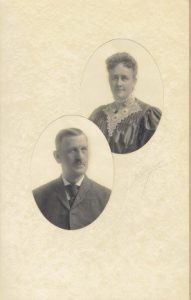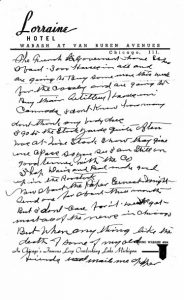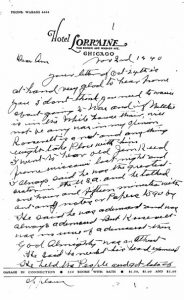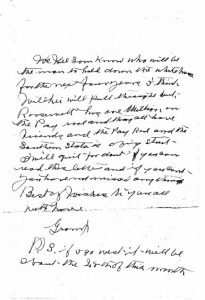Many of our long-sought ancestors remain elusive despite our best efforts to find their hiding places, creating those inevitable brick walls. “Usually if the spirits want you to find something, you do. And if they don’t want you to find something, they don’t let you into the secret. Trust me.”[1]
One such “spirit” is my father’s step-grandfather, Fred A. Hayward.
Born in Vassalboro, Maine about 1860, one of six children of William C. and Margaret Fletcher (Lynn) Hayward, Fred in 1903 married my widowed great-grandmother Nellie (Ellen Frances Cony Church) as her second husband. I know little about Fred, and most of what I know I draw from what Fred left behind.
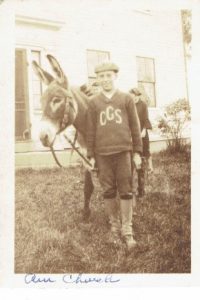 A horse dealer by occupation, Fred traveled often to Chicago to be near the stockyards, shipping horses to Maine by train, then stabling them at a farm about a mile from the house he shared with Nellie, a few hundred yards from My Old House in Augusta. From all indications, Nellie was the love of his life; Fred was a mainstay for my father in troubles and dark times, the only grandfather he ever really knew. He even bought Dad a Mexican burro to ride at home.
A horse dealer by occupation, Fred traveled often to Chicago to be near the stockyards, shipping horses to Maine by train, then stabling them at a farm about a mile from the house he shared with Nellie, a few hundred yards from My Old House in Augusta. From all indications, Nellie was the love of his life; Fred was a mainstay for my father in troubles and dark times, the only grandfather he ever really knew. He even bought Dad a Mexican burro to ride at home.
For many years they summered in Maine but wintered in Chicago, staying in residential areas familiar to Fred from his many years traveling to that city. Fred bought and sold horses, Nellie enjoyed the nearby parks and cultural life, and my grandfather played drums in his local band.
When Nellie died in early 1934, Fred found little joy in life, and in 1939 at age 79 he decided to travel to Portland, Oregon to visit his older brother George F. Hayward (1857–1942). He may have traveled, perhaps with his horse, by the Western Star railroad, a line that would have taken him through Chicago and Seattle to Portland, as planned, or he may have driven a vehicle with or without a horse trailer. In addition to the Hotel Lorraine, he stayed at the Harrison Hotel and its Electric Garage, the tallest purpose-built, exclusively parking structure in the U.S. at the time.
Never a great letter writer, two of his letters to my father exist dated February 13, 1940, and November 2, 1940, written on Hotel Lorraine stationery. Chatty more than newsy, Fred’s February letter gives advice on horses, and notes how the French Government had bought 3,000 horses for the cavalry with plans to buy their artillery horses in Canada. (On the cusp of a major change in warfare, one can only wonder at that.) He also talks about meeting his old circus friends and the status of the Downie Brothers, Ringling, and Barnum Circuses, and how Chicago pay is “extry good” but “thousands out of work.”
In his November letter, Fred, a Wendell Wilkie supporter, is emphatic in his politics and modest about his knowledge of raising cows instead of horses.
By the time he wrote this letter, he had apparently been in Chicago for almost a year, and expresses some indecision as to whether he would leave to continue on to Oregon. He posted the letter on November 2nd ... and vanished.
Fred A. Hayward was never heard from again.
He never arrived at his brother’s house, and after “official channels” had no success in tracing him, the family hired a private detective to find Fred without results. Worried, desperate, or just curious, they also consulted more than one psychic, none of whom could give any definitive information (“It is so hot, so hot – I feel pain and everything goes black,” or “he was shot for his horse!” Not exactly highly specific help from those secretive spirits!).
No other information about his movements in Chicago has ever come to light after November 1940, and I decline to believe that he “ran off to join the circus,” given his age and the sorry financial states of those groups. While I have a feeling that he never left Chicago but may have died there, unidentified, possibly of a heart attack, it is proving to be a daunting task to trace a “John Doe” from 77 years ago! While there are “John Doe” medical examiners’ records available in the counties most likely on his route from Chicago to Portland, the requirements to obtain those records require that I provide proof my relationship to the deceased. As soon as I figure out how to provide proof of kinship to an otherwise unknown person who may not be Fred, I’ll make those calls!
Fred is definitely Dead Fred now, as I fondly refer to him. But these spirits are quiet, and the secrets of his disappearance, death, and burial are firmly mortared into my brick wall.
Note
[1] Dee Morris, Medford (Mass.) Cemetery Board of Trustees, commenting on the reluctance of some of our ancestors to divulge their secrets in "Rediscovering A Curious Cemetery Fad From The Years Following The Civil War," WBUR.org/The Artery, June 14, 2017.
Share this:
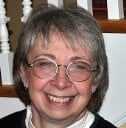
About Jan Doerr
Jan Doerr received a B.A. degree in Sociology/Secondary Education from the University of New Hampshire, and spent a long career in the legal profession while researching her family history. She has recently written and published articles for WBUR.org’s Cognoscenti blog: “Labor of Love: Preserving a 226-Year-Old Family Home and Preparing to Let It Go” and “The Value of Family Heirlooms in a Digital Age.” Jan currently lives with her attorney husband in Augusta, Maine, where she serves two Siamese cats and spends all her retirement money propping up a really old house.View all posts by Jan Doerr →
